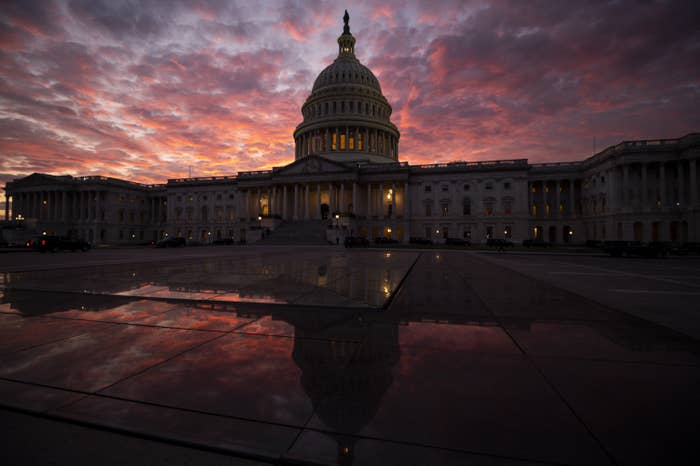
Congressional jostling reached new and confusing heights Thursday as senators voted to disenfranchise themselves in order to avoid a government default.
It is the dramatic conclusion of a monthslong staredown between Republicans and Democrats with the nation’s finances hanging in the balance. Also, it involves such convoluted political and legislative maneuvering that exactly what happened is all but impenetrable to anyone other than politicians and the people paid to watch them.
The short version is this: The Senate needs 60 senators to vote to raise the debt ceiling, stopping the US government from running out of money and defaulting on its debts and shutting down. Republicans don’t want to raise the debt ceiling, but they also don’t want to be held responsible for a government shutdown. So they voted to let their votes not matter.
All 50 Democrats and 14 Republicans voted to advance a bill that does not lift the debt ceiling but does create a one-time change to the rules so that Democrats can pass another bill in a week or so to raise the debt ceiling with only 50 votes. Having voted to ensure their votes don’t matter, Republicans can now vote against the second bill later this month.
This means that the worst-case scenario — a government default, mass furloughs before the holidays, markets crashing — will be averted.
“I am optimistic that after today’s vote we will be on a glide path to avoid a catastrophic default,” Majority Leader Chuck Schumer said.
For a quick refresher on the legislative process, here is how, in 2021, a bill becomes a law:
Occasionally, Congress needs to raise the debt ceiling, the arbitrary cap on how much money the American government can borrow. But sometimes the party that is not in power doesn’t want to raise the cap as an act of protest. Sometimes that party doesn’t want to be seen voting to raise the debt ceiling while they’re campaigning against the majority party’s $1.5 trillion social spending and environment bill that they say will cause too much debt.
And sometimes the minority party’s former president launches a pressure campaign from his Florida compound urging them to use the debt ceiling to “totally kill” the current government. Sometimes that party is very attuned to the demands of their former president because politicians who disobey him have a tendency to be taken out back and shot, metaphorically speaking, when it comes to primary races.
One option is for the minority leader in the Senate to send a strongly worded letter to the president vowing not to help lift the debt ceiling. The leader could argue that the majority can raise the debt limit on their own if they use a process called budget reconciliation.
The risk there is that the majority leader in the Senate might respond, hold on, he doesn’t want to use budget reconciliation because that’s annoying and time consuming and keeps him from doing other stuff he wants to do like confirming nominees. So he doesn’t do it. And then it becomes a standoff as the country heads towards a fiscal cliff until one side blinks.
That’s how Congress got here. Ultimately, Senate Minority Leader Mitch McConnell caved on his threats and agreed to help Democrats lift the debt ceiling.
To make it more palatable for Republican members to go along with it, the parties agreed on an unusual plan. The Senate voted 64–36 Thursday to override the filibuster on a bill to avoid Medicare cuts. Tucked in that bill are special provisions allowing Democrats to pass a filibuster-proof debt ceiling increase later this month with only 50 votes. The Senate voted later Thursday to pass the measure, 59–34.
Democrats in the House voted to pass the Medicare bill earlier this week, meaning it can now go to Joe Biden’s desk.
In the end, everyone is relieved but no one is happy. Democrats have one less thing to worry about but are still fighting over their Build Back Better Act. Republicans who voted for the debt ceiling deal painted it as necessary to avoid catastrophe. Other Republicans, including the former president, say McConnell made a mistake and should never have cut a deal in the first place.
Republican Sen. Bill Cassidy was asked why he voted against the deal as he left the Senate chamber. Channeling the zeitgeist of Congress, he paused, hemmed, and hawed for 18 seconds before saying, “I would have preferred a different process.”
